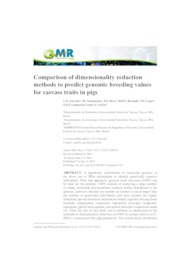Comparison of dimensionality reduction methods to predict genomic breeding values for carcass traits in pigs.
Comparison of dimensionality reduction methods to predict genomic breeding values for carcass traits in pigs.
Summary: A significant contribution of molecular genetics is the direct use of DNA information to identify genetically superior individuals. With this approach, genome-wide selection (GWS) can be used for this purpose. GWS consists of analyzing a large number of single nucleotide polymorphism markers widely distributed in the genome; however, because the number of markers is much larger than the number of genotyped individuals, and such markers are highly correlated, special statistical methods are widely required. Among these methods, independent component regression, principal component regression, partial least squares, and partial principal components stand out. Thus, the aim of this study was to propose an application of the methods of dimensionality reduction to GWS of carcass traits in an F2 (Piau x commercial line) pig population. The results show similarities between the principal and the independent component methods and provided the most accurate genomic breeding estimates for most carcass traits in pigs.
Publication year: 2015
Types of publication: Journal article
Unit: Embrapa Forestry
Observation
Some of Embrapa's publications are published as ePub files. To read them, use or download one of the following free software options to your computer or mobile device. Android: Google Play Books; IOS: iBooks; Windows and Linux: Calibre.
Access other publications
Access the Agricultural Research Database (BDPA) to consult Embrapa's full library collection and records.
Visit Embrapa Bookstore to purchase books and other publications sold by Embrapa.

